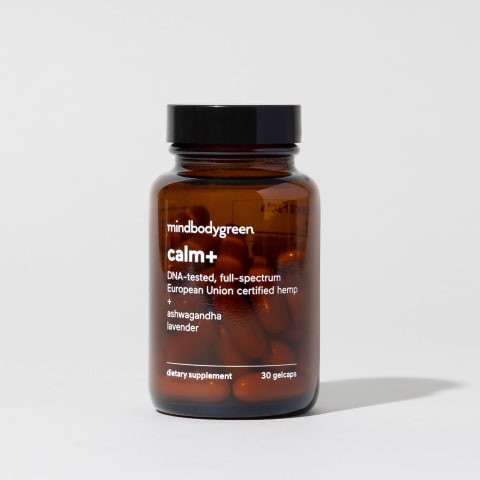Advertisement
How Much Hemp-Derived CBD Do You Actually Need To Relax? Doctors Weigh In*


Ashley Jordan Ferira, Ph.D., RDN is Vice President of Scientific Affairs at mindbodygreen. She received her bachelor's degree in Biological Basis of Behavior from the University of Pennsylvania and Ph.D. in Foods and Nutrition from the University of Georgia.
Many people find hemp-derived CBD useful for reducing physical and mental stressors and encouraging feelings of relaxation.* If you're looking to try hemp-derived CBD to relax, here's what to know about when, how, and how much of it to take at a time.*
How hemp-derived CBD works.
There are two main types of CBD—hemp-derived CBD and marijuana-derived CBD—and if you're confused about the difference between the two, you're not alone. Both kinds of CBD are sourced from the cannabis plant, but similar to how your thumb is a finger but not every finger is a thumb, hemp is cannabis, but not all cannabis is hemp.
What sets these two sources of CBD apart is their distinctly different levels of phytocannabinoids (e.g., cannabidiol, tetrahydrocannabinol, etc.). In fact, by definition, their levels of tetrahydrocannabinol (THC), the psychoactive component that gives you a sense of high, are very different. Hemp has negligible, trace amounts of THC (less than or equal to 0.3%1), while marijuana contains higher amounts of THC (much more than 0.3%). That's per U.S. law.
"It's primarily an issue of the legal classification," says Babak Larian, M.D., clinical chief of the Division of Otolaryngology, Head and Neck Surgery at Cedars-Sinai Medical Center in Los Angeles, California, and co-founder of MDbio.
So, how does nonpsychoactive, hemp-derived CBD work to promote relaxation? According to Larian, it works in tandem with the human body's endocannabinoid system, which is responsible for restoring homeostasis (balance) in the body.*
"The feeling of taking a hemp product is one of achieving a state of balance more easily or more fully if you're having a difficult time doing so (whether physically, emotionally, or both, in many cases),"* he tells mbg. "In short: [Hemp-derived CBD encourages] balance, equilibrium, and harmony."*
A note on FDA regulations: The 2018 Farm Bill states hemp-derived CBD products containing less than 0.3% THC are "no longer controlled substances under federal law." The FDA does, however, continue to regulate cannabis or cannabis-containing products, including industrial hemp.
And in addition to this helpful oversight, the scientific evidence is growing for cannabis, with studies showing that the hemp plant offers a slew of health benefits, from easing stress2 to promoting healthy sleep cycles3.*
- Ashley Jordan Ferira, Ph.D., RDN is Vice President of Scientific Affairs at mindbodygreen.
- Babak Larian, M.D., is clinical chief of the Division of Otolaryngology, Head and Neck Surgery at Cedars-Sinai Medical Center in Los Angeles, California, and co-founder of MDbio.
- Jacob Teitelbaum, M.D., is a board certified internist and nationally known expert in the fields of chronic fatigue syndrome, fibromyalgia, sleep and pain.
- Dave Gordon, M.D., is a double board-certified in both internal and integrative medicine, and an expert in medical cannabis.
Hemp-derived CBD benefits for relaxation.
Are you feeling stressed? In addition to other natural stress relievers, like yoga, stress balls, and chamomile tea, hemp-derived CBD may also reduce the mental and physical toll of anxiousness2.*
"Most of us live in an overactive, overexcited state of existence," says Larian. "Some of us are gifted to do so easily; some of us need a little more help! If you've had a hard day at work, a well-formulated hemp product can help you calm down."*
And if stressful thoughts keep you up at night, studies also show that hemp-derived CBD3 may help relax your busy mind to make sleep easier to come by.*
What to know about dosage.
The amount of hemp-derived CBD a person should take at a time to relax depends on three key factors: the individual, their needs, and the product they're using.
In the current hemp landscape, for which you'll find considerable diversity, 10 milligrams of CBD daily is considered a low or mild dose, while 20 to 25 milligrams is moderate to midrange, and 45 to 50 milligrams on up is on the stronger side of potency.
But again, that depends on the individual. Larian advises elderly people and those who know they are more sensitive to the effects of hemp-derived CBD to start at a lower dosage, about 10 milligrams per day, and work their way up "by 5 milligrams every three days until [you] achieve the desired effect."
If you're working with a health professional to use CBD for a more targeted purpose—say, to help you sleep more deeply through the night—they may recommend a higher serving size or higher potency product, depending on your needs.* For example, sleep expert Jacob Teitelbaum, M.D., tells mbg he typically recommends clients use about 50 milligrams to assist with sleep.*
Dave Gordon, M.D., who is double board-certified in both internal and integrative medicine, and an expert in medical cannabis, adds that the right serving size of CBD will also vary from product to product.
It's typically easier to get consistent serving sizes with preportioned hemp products like capsules or gummies (please note, the sugars and other additives to consider) than oils, which you need to measure out yourself.
What time of day should it be taken?
Similar to how the amount of hemp-derived CBD you take is circumstantial, what time of day you should take it is also contingent on a variety of factors.
For general relaxation purposes, Teitelbaum suggests taking it as needed when you find yourself in stressful situations.* However, if CBD makes you a bit drowsy, Larian recommends splitting up your serving size by taking half in the morning and a half at night. On the other hand, if you're taking CBD specifically to help you relax into sleep at night, taking a full serving size a little while before bed will yield the best results.*
What to look for in a CBD supplement.
Hemp CBD products run the gamut these days. Oils, capsules, gummies, lollipops—you name it, there's a CBD version of it. With shelves of options to choose from, finding the right hemp-derived CBD supplement for your individual needs can be challenging and require some trial and error. However, there are some things to look out for when reviewing a sea of labels that can help you better suss out the products that aren't worth your money.
For example, Larian caveats products that contain "hemp-derived CBD isolate." He's personally not an advocate of CBD isolate options because some people do not respond optimally to concentrated CBD in higher amounts in isolation. He notes that these people may experience issues like hyperactivity or less regularity, he tells mbg.
Instead, most people benefit from full-spectrum hemp extracts or broad-spectrum options, as these contain the fuller spectrum of other beneficial plant compounds, instead of isolating one phytocannabinoid on its own (CBD).*
Additionally, because there is no premarket approval process for hemp-derived CBD supplements (although plenty of laws and regulations exist that the reputable brands follow), it's important to do your research on the brands you're interested in buying from to ensure their products are high-quality.
If the company grows its hemp organically; provides full and/or broad-spectrum options to harness the entourage effect; uses clean extraction methods and tests for botanical identity, purity (i.e., heavy metals, microbes), and potency (i.e., to confirm the dose of CBD provided, and for confirmation of trace THC levels); has its products tested by a third-party lab; and is transparent with customers in general, then Gordon tells mbg it's likely of good quality. For more specific product recommendations, check out our cbd capsule roundup.
Possible side effects.
Unless you've tried it in the past, you can't really know what CBD feels like or is going to feel like in your body. Its effects change slightly from person to person.
The good news is Gordon, Larian, and Teitelbaum all agree hemp oil or extracts and the CBD from hemp is generally very well tolerated by the human body and negative side effects are uncommon. However, some uncommon potential side effects associated with CBD usage to be aware of include dry mouth, issues with regularity or appetite, and drowsiness.
These potential effects can be caused by individual biological differences in how the phytocannabinoids are interacting with their physiology or less commonly, an interaction with a medication they're on, like blood thinners, says Larian. Of course, any update in your supplement regimen should be informed by health professional expertise.
The bottom line.
If you're looking for a gentle and plant-derived supplement for stress relief and relaxation, it may be worth experimenting with a well-dosed hemp-derived CBD.* Of course, as you would with any supplement or new medication, speak with a doctor to make sure it is safe and makes sense for your lifestyle.
Watch Next
Enjoy some of our favorite clips from classes
Enjoy some of our favorite clips from classes
What Is Meditation?
Mindfulness/Spirituality | Light Watkins
Box Breathing
Mindfulness/Spirituality | Gwen Dittmar
What Breathwork Can Address
Mindfulness/Spirituality | Gwen Dittmar
The 8 Limbs of Yoga - What is Asana?
Yoga | Caley Alyssa
Two Standing Postures to Open Up Tight Hips
Yoga | Caley Alyssa
How Plants Can Optimize Athletic Performance
Nutrition | Rich Roll
What to Eat Before a Workout
Nutrition | Rich Roll
How Ayurveda Helps Us Navigate Modern Life
Nutrition | Sahara Rose
Messages About Love & Relationships
Love & Relationships | Esther Perel
Love Languages
Love & Relationships | Esther Perel
What Is Meditation?
Box Breathing
What Breathwork Can Address
The 8 Limbs of Yoga - What is Asana?
Two Standing Postures to Open Up Tight Hips
How Plants Can Optimize Athletic Performance
What to Eat Before a Workout
How Ayurveda Helps Us Navigate Modern Life
Messages About Love & Relationships
Love Languages
Advertisement

This Type Of Fat Is Vital For Women's Health — Are You Getting Enough?
Molly Knudsen, M.S., RDN

New Study Confirms The 3 Habits That Age Your Brain Faster
Molly Knudsen, M.S., RDN

This Type Of Fat Is Vital For Women's Health — Are You Getting Enough?
Molly Knudsen, M.S., RDN

New Study Confirms The 3 Habits That Age Your Brain Faster
Molly Knudsen, M.S., RDN














